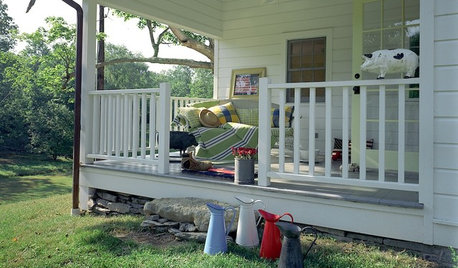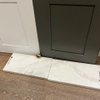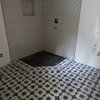Remodeling without a permit?
A contractor I am/was considering to do remodeling work where plumbing and electrical additions will be made told me the following when we were discussing the job:
"Why bother with getting a permit, we will do the job correctly. Not getting a permit will save you time (no delays waiting for inspections) and money. There is no need to"
I am real nervious about this advise. Not so much because of concern of the work being done incorrectly, but because of the neighbors. The fellow two doors down told me one day that the guy between us called the County on him for various things (they have a feud going on). I noticed on my County's web site a form to repoprt aledged/suspected work without permits. You can file the report online.
Here's my question: If one has work done (new plumbing and a new electrical circuit wired) in conjunction with the remodel job and a complaint is filed and an investigation opened, what happens to the homeowner that had the work done? How serious an offense is this? Will the inspector drop by and demand to see the wiring and plumbing work and request that the drywall be removed to view it? This would be a nightmare if this were to happen after the job was completed.
This advice from this contractor sounds just plain bad.
--Thanks.
--Nate
Comments (150)
User
8 years agoA building permit is additional evidence that you paid for improvements to your house which reduces your capital gains tax. Of course, it doesn't matter unless you are audited and then everything counts.
bry911
8 years agocreativejm -
So you are telling me that your insurance company has a specific exclusion for for unpermitted work? Please copy and paste the section of the policy here, I would like to see it because barring a specific exclusion insurance legally has to pay all non excluded items unless they find bad faith or fraud.
Now the insurance company may immediately subrogate the claim and go after the contractor who didn't obtain the proper permit, but they have no legal reason to avoid payment. The homeowner who subbed out work didn't act in bad faith. Of course, insurance companies try not to pay all kinds of stuff, that is the reason that my television is so crowded with attorney commercials but without a specific exclusion it is going to get paid.
Related Professionals
Cuyahoga Falls Kitchen & Bathroom Designers · Kalamazoo Kitchen & Bathroom Designers · Verona Kitchen & Bathroom Designers · Wentzville Kitchen & Bathroom Designers · Honolulu Kitchen & Bathroom Remodelers · Kuna Kitchen & Bathroom Remodelers · League City Kitchen & Bathroom Remodelers · Rolling Hills Estates Kitchen & Bathroom Remodelers · Palestine Kitchen & Bathroom Remodelers · Burlington General Contractors · Asheboro General Contractors · Bay Shore General Contractors · Del Aire General Contractors · Groton General Contractors · View Park-Windsor Hills General ContractorsUser
8 years agoA homeowner cannot avoid their responsibility to the state and city to meet all relevant requirements of the applicable building codes. However, the homeowner might be able to sue the contractor for not complying with those laws.
sjhockeyfan325
8 years agoA building permit is additional evidence that you paid for improvements
How is a building permit evidence of payment? It's evidence that you submitted plans and got them approved, that's all.
User
8 years agoThat may be all a permit is in your state. Towns in my state require a signed contract to get a permit and an owner's affidavit stating the final cost in order to establish the permit fee. All this information is available to anyone who asks to see the property file.
wantedplunder
8 years agoWe have owned our home for about 46 years, but just recently have resided in it. My husbands mother resided in the home previously. While she lived in the home one of the baths were remodeled. -- the city records show a 5 bedroom 1.5 bath home - where now currently the house is 5 bedroom 2 bath. It is possible that instead of the tax assessment of 6K on a home that is 5 bedroom 1.5 bath has increased the tax value to more.
If the bath was not permitted, which I don't think it was, and it was done well over 20 years ago, are we liable for back tax value? as well as permitting.
This might be a can of worms -- for would not the city show in the records that the house is a 5 bedroom 2 bath if the bath remodel was permitted?
kudzu9
8 years agowantedplunder-
I doubt that the city would much notice or care about something that old, and you certainly wouldn't be responsible for back taxes. There are enough errors in housing records that I don't think anyone would hassle you about this minor difference. I live in a 15 year old house; my three neighbors have identical houses to mine and the city lists three different numbers for baths even though the four houses are the same. None of us is worried about it.
geoffrey_b
8 years ago@Joseph: Why spread such fear / crap / drech ? All I can think of is you're pretty much insecure in your business.
From reading your various posts, I'd say you are the passive / aggressive type of person.
But, hey, you have a license.... big deal.
kudzu9
8 years agoJoseph-
I appreciated that link as an alternate view. The situation certainly varies from area to area, depending on how "energetic" the code folks are. The important distinction I did note, however, was that the folks who were having problems in that story were people who had gotten the attention of the codes people in the first place by getting a permit and then not following through completely. I'm not arguing for non-permitted work. I'm just saying that if one had had minor, non-permitted work done some years ago, I doubt that the code folks would have a way to catch that.
bry911
8 years agoThe biggest real problem with unpermitted work is that now you must disclose it to sellers. To be fair the horror stories with inspectors going back over years of data to close permits is really nothing more than an attempt to clean up the records, and really doesn't apply to most of the country. However, disclosures may have an effect on resale value, and as such you might find it beneficial to correct the issue before resale. I certainly wouldn't bother trying to correct the issue before you are considering resale.
The tax stuff is not a significant concern, in tax court you would probably win a case as, it is the tax agency's responsibility to assess ad valorem taxes, not yours. In practice, they may assess you a few years back taxes (because revenue departments are generally not filled with the best and brightest), which you will pay because there will be no penalties and even in high taxing districts converting a half bath to a full bath will be very little money.
kudzu9
8 years agogeoffrey-
You give me too much credit...I've cranked out a few comments that don't represent my better nature ;-)
Joseph Corlett, LLC
8 years ago"If the bath was not permitted, which I don't think it was, and it was done well over 20 years ago, are we liable for back tax value? as well as permitting."
My fear/crap/drech link was a relevant, direct, and timely answer to a fairly asked question, although it's always nice to get an irrelevant amateur psychological diagnosis for my efforts.
Licensing is probably overrated. After all, who has ever died from bad medicine or lawerying?bry911
8 years agoJoseph, I read the question as asking about taxing not permitting. My answer to taxing is - no.
If the question is permitiing my answer is simple, you should get a permit, if you didn't, then you should correct in a timely fashion, if possible. But once you are beyond "timely fashion" correction makes little to no sense. You gain no real benefit at a significant cost, it is doubtful that the work would pass present code and any penalties or fines for not permitting are already incurred. So you are much better off waiting until you need to update the bathroom and do permitted work then.
elciomardegan
7 years agoi just recently purchased a house that has been remodeled by the homeowner, however he put a brand new roof with no permit, i hired a contractor to come look at the work was done and he said everything is up to code, however i would like to get the permit for the roof, is there anyways to fix that after the roof is alredy done, this is in florida. thank you
Joseph Corlett, LLC
7 years agoAs the homeowner in Florida, you are allowed to pull your own permit, however, seeing how you've already discovered a proper installation, I'm not seeing any upside to alerting inspection.
sambah006
7 years agoUnless there was structural work done on the roof, no permit is required. I guess this may be different in Florida.
Tell you what, make up a name to call yourself. How about John. Call up the building department in your city and tell them your name is John, and you were wondering if a new roof requires a permit and hear what they say.
elciomardegan
7 years agothanks guys, i called building department and they can come and do an inspection, it will cost $680.
mtvhike
7 years agoAs was said above, it depends on the jurisdiction. Fear of the answer sometimes prevents even asking the question, so people act based on rumor. In my town, rumor has it that if a house is converted to a rental, then everything has to be brought up to current code (even if it means running new water lines from the street, etc.). One of my neighbors bought a house in our neighborhood, which had an accessory apartment in the basement. It should have been caught by the his lawyer, but wasn't. He had to demolish that apartment, because accessory apartments are not allowed (even though many exist).
Houp Tee
7 years agoFor New Jersey the following is allowed without a permit:
§ 5:23-2.7 Ordinary maintenance
(a) Ordinary maintenance to structures may be made without filing a permit application with or giving notice
to the construction official.
(b) Ordinary maintenance shall not include any of the following:
1. The cutting away of any wall, partition or portion thereof;
2. The removal or cutting of any structural beam or bearing support;
3. The removal or change of any required means of egress, or rearrangement of parts of a structure affecting
the exitway requirements;
4. Any work affecting structural or fire safety;
5. Any work that will increase the nonconformity of any existing building or structure with the requirements
of the regulations; 6. Addition to, or alteration, replacement or relocation of:
i. Any standpipe;
ii. Water supply, sewer, drainage, gas, soil, waste, vent or similar piping;
iii. Electrical wiring, except that the following shall be considered ordinary electrical maintenance:
(1) Communications wiring in a Class 3 structure provided that the installation does not involve the alteration
or penetration of a fire-rated assembly and is not in a hazardous location as defined in Chapter 5 of the
electrical subcode.
(A) For the purposes of applying this provision, communications wiring shall mean any wiring covered by
Chapter 8 of the electrical subcode. Communications wiring shall also include data circuits between computers/information
technology equipment, which may be classified as "communications circuits," in accordance
with Article 725 of the electrical subcode; or
iv. Mechanical or other work affecting public health or general safety; or
7. Any work undertaken for the purpose of lead abatement.
(c) The following items are ordinary maintenance and shall be treated as such by every enforcing agency.
No permit for, inspections of, or notice to the enforcing agency of ordinary maintenance shall be required.
This is not an all-inclusive listing of ordinary maintenance.
1. Ordinary building maintenance shall include:
i. Exterior and interior painting;
ii. Installation, repair or replacement of any interior finishes of less than 25 percent of the wall area in any
given room in a one- or two-family dwelling. This shall include plastering and drywall installation;
(1) Vinyl wall covering of any amount is ordinary maintenance;
(2) Paneling shall not be considered ordinary maintenance;
iii. Wall papering at any location;
iv. The replacement of glass in any window or door. However, the replacement glass shall be of a type
and quality that complies with the minimum requirements of the code;
v. The installation and replacement of any window or door, including garage doors, in the same opening
without altering the dimensions or framing of the original opening. This shall include storm windows and
storm doors. The installation and replacement of means of egress and emergency escape windows and
doors may be made in the same opening without altering the dimensions or framing of the original opening,
and shall not reduce the required height, width or net clear opening of the previous window or door assembly;
vi. The repair or replacement of any non-structural member such as a partition railing or kitchen cabinet;
vii. The repair or replacement of any interior or exterior trim, decoration or moldings;
viii. The replacement or installation of any flooring material with a new material; x. The repair of existing roofing material not exceeding 25 percent of the total roof area within any 12
month period;
x. The repair of existing siding with like material not exceeding 25 percent of the total building exterior
wall area within any 12 month period;
xi. The repair or replacement of any part of a porch or stoop which does not structurally support a roof
above;
xii. The replacement or installation of screens;
xiii. The installation of any roll or batt insulation when installed adjacent to or not more than one and a
half inches from an interior finish; and
xiv. Replacement of exterior rain water gutters and leaders.
2. Ordinary plumbing maintenance shall include:
i. Replacement of hose bib valves in single family dwellings. Replacement hose bib valves shall be provided
with an approved atmospheric vacuum breaker;
ii. Refinishing of existing fixtures. Relining of fixtures shall not be considered to be ordinary maintenance;
iii. Replacement of ball cocks. Replacement ball cocks must be an approved anti-siphon type;
iv. Repair of leaks involving the replacement of piping between two adjacent joints only;
v. Clearance of stoppages;
vi. Replacements of faucets or working parts of faucets;
vii. Replacement of valves (including shower or combination bath/shower valves in a single family dwelling);
viii. Replacements of working parts of valves, including, but not limited to, shower or combination
bath/shower valves;
ix. Replacement of traps except for traps on culinary sinks in food handling establishments;
x. Replacement of a water closet, and/or lavatory, and/or bathtub or shower unit and/or kitchen sink in a
single family dwelling with an approved similar fixture provided that no change in the piping arrangement is
made. Replacement water closets bearing a date stamp of July 1, 1991 or later must use an average of 1.6
gallons or less of water per flushing cycle; and
xi. Replacement of domestic clothes washers and dishwashers.
3. Ordinary electrical maintenance shall include:
i. The replacement of any receptacle, switch, or lighting fixture rated at 20 amps or less and operating at
less than 150 volts to ground with a like or similar item, including receptacles in locations where ground-fault
circuit interrupter protection, damp/wet or tamper-resistant are required (Sections 210.8, 406.8 and 406.11,
respectively, of the electrical subcode); ii. Repairs to any installed electrically operated equipment such as doorbells, communication systems,
and any motor operated device. Provided, however, that if fire protection systems are interrupted for repairs
the fire official shall be notified in accordance with the building subcode;
iii. Installation of communications wiring for communications wiring in a Class 3 structure, provided that
the rearrangement does not involve penetration of a fire-rated assembly and is not in a hazardous location
as defined in Chapter 5 of the electrical subcode;
(1) For the purposes of applying these provisions, communications wiring shall mean any wiring covered
by Chapter 8 of the electrical subcode, such as telephone, radio antenna, or coaxial cable TV wiring. Communications
wiring shall also include data circuits between computers/information technology equipment,
which may be classified as "communications circuits," in accordance with Article 725 of the electrical subcode;
and
iv. Replacement of domestic dishwashers; and
v. Replacement of kitchen range hoods in single family dwellings.
4. Ordinary fire protection maintenance shall include:
i. The replacement of any sprinkler or smoke detector or heat detector head with a like device;
ii. The repair or replacement of any component of a fire alarm or smoke and heat detection equipment
(other than the replacement of a fire alarm control panel);
iii. The installation of battery-powered smoke detectors; and
iv. The installation of battery-powered or plug-in type carbon monoxide alarms.
5. Ordinary heating, ventilation and air conditioning maintenance shall include:
i. Replacement of motors, pumps and fans of the same capacity;
ii. Repair and replacement of heating, supply and return piping and radiation elements, which does not
require rearrangement of the piping system;
iii. Repair and replacement of duct work;
iv. Repair of air conditioning equipment and systems; and
v. Repair or replacement of control devices for heating and air conditioning equipment; and
vi. Replacement of kitchen range hoods in single family dwellings.
vii. Replacement of clothes dryers serving and located within dwelling units, provided that no change in
fuel type or location or electrical characteristics is required.
viii. Replacement of stoves and ovens in dwelling units, provided no change in fuel type or location or
electrical characteristics is required. http://www.nj.gov/dca/divisions/codes/codreg/pdf_regs/njac_5_23_2.pdfHoup Tee
7 years agoFor New Jersey this Bulletin: Date: February 2006 Subject: Work Performed Without
Permits
Reference: N.J.A.C. 5:23-2.23(e)
Page 1 of 2
06-1
The Department of Community Affairs has become aware of construction
officials’ concerns about how to proceed when it is discovered that homeowners
have performed construction work without obtaining the appropriate Uniform
Construction Code (UCC) permits. In some cases, this comes to light only when the
home is subjected to a resale inspection or a reevaluation inspection. As a result,
construction officials are faced with deciding how to handle the work done without a
permit with the new homeowners. This bulletin is intended to provide guidance on
how to enforce the provisions of the UCC in an equitable manner when it is discovered
that a previous homeowner or the current seller has performed construction work
without the required permits after the work has been completed.
If it is discovered that work was performed without a permit by a previous
homeowner, construction officials should perform a Certificate of Continued
Occupancy (CCO) inspection for the new homeowner. A CCO inspection is a
reasonable solution for ensuring that construction work is properly documented and
that future owners are not held responsible for violations resulting from work performed
without permits. The documentation for a CCO inspection should include a report
describing the work that was completed without a permit. Construction officials
should be aware that CCO inspections are limited to those portions of the home that
are visible. For items that are not visible, there must be probable cause to warrant
uncovering the work to allow for inspections. The code official is not compelled to
perform a destructive inspection unless there is reason to believe that a life-safety
violation exists.
If it is discovered that work was performed without a permit by the current
homeowner, the construction official may offer the homeowner a CCO inspection at
his or her discretion, unless there is probable cause to warrant uncovering the work.
If a contractor was involved and is known, the construction official should issue
notices, require that a permit be obtained, and implement the enforcement actions
prescribed by the UCC. In addition, construction officials should require homeowners to obtain a permit for any corrective work that would require a permit under normal
circumstances, in accordance with the UCC. http://www.nj.gov/dca/divisions/codes/publications/pdf_bulletins/b06_1.pdfmtvhike
7 years agoIn my jurisdiction, if you get caught the minimum penalty would be making it possible for an inspection to be done (probably removing all sheetrock), paying for said inspection, paying for the permit, and paying a penalty. It could be removing all improvements using a licensed builder, paying for permits for said removal and then starting over. We had a standalone garage converted into an artists studio (using licensed contractors) and, several years later when we considered getting a rental permit so we could rent it out as an apartment, we were told by a real estate agent (who would be the rental agent) that we would have to rip everything out and start over. (Ripping everything out includes plumbing with septic system, heating system, bathroom, kitchen, and all wiring!). Serious stuff!
wildchild2x2
7 years agoCutting and pasting my post from another thread I made today. The OP's thread was titled Help re: plumbing inspection
My response:The permit process is becoming more and more draconian. It also varies from city to city and county to county.
My daughter who lives in another county called a half dozen plumbers today to bid on a water heater installation. If she buys one locally she will have to pull a permit. She figured it would be easier for them to pull it since they "do it all the time". Not one of them said they will pull permits. Told her the reason is once you allow an inspector into your home these days it's like agreeing to allow a rogue cop to search your car without a warrant. Horror stories of people having to redo things the inspector sees that in the recent past would have been grandfathered in. Often things that have nothing to do with actual item being inspected. Ends up costing the homeowner 1000s more than they had bargained for.
I found the same thing while shopping around for various remodeling items here. Windows, doors, skylights, lighting. When I asked about permits for installation the common answer was, we don't get permits, it starts a process that snowballs out of control. These are reputable businesses that have been around for years.
So the tighter restrictions are going against making sure things are safer and done right. But the reality is the few times we have pulled permits for things the inspectors were mostly pretty much clueless about what they were looking at. They have a check sheet but many have no actual knowledge of the words on the sheet mean. Government bureaucracy. Much to do about $$$$$$, Revenue. Little to do about safety.
kudzu9
7 years agowatchmetal-
I can't say what the situation is generally in the thousands of jurisdictions around the country, but that kind of aggressive/abusive enforcement has not been my experience anywhere I have lived. I imagine that if an inspector was looking at a job and saw some other recent work that was not to code there would be a discussion about it, but in dozens of inspections over decades I've never had a single inspector start nosing around for other things. My experience is that most of them are very busy and want to get in and out as fast as they can. i've had a few that were extremely rigid and tried to take the most severe interpretation of the code on a current job to the point where it's gotten ridiculous, and I've had to get the chief inspector for the county involved. But I've never been told I needed to bring old, previouly allowed work into compliance with a new code requirement, unless, say, I was working on part of an old, ungrounded electrical circuit, and I had to bring that whole circuit into compliance all the way back to the breaker box. I think if I lived in a place like you described, I might get motivated to get the local media involved, and draw attention to these practices. I think code compliance is really important, but not when it goes beyond safety and becomes an abuse of power and taxing authority.
geoffrey_b
7 years agoFrom my experience as a DIY homeowner, who has remodeled several of our kitchens and bathrooms - here in Minneapolis, where I would say they want every dollar out of you they can possibly get: They only inspect what you have the permit issued for. Some of the inspectors are through - and I appreciate it - at least you have another set of eyes on the work. Others are just rubber stamps. The worst was an electrical inspector, a Hispanic woman, who knew nothing about the trade. But this is PC Minneapolis.
Permits are a way to control quality, but are also a revenue generator.
toxcrusadr
7 years agoIt varies a LOT by jurisdiction. When I built my shop building - with electric, although no running water - I got a real good county inspector who understood I was working full time at a job, and he didn't rush me to get things done. As long as he could come out to look at something every 6 months, he was cool. Now, the guy on the phone when I initially called about permits was a total dork and basically said I could never get a permit for what I was proposing to build. But the inspector said "I know who that is. Don't worry about it." We got along fine. My permit was $150 for a 3000 sf building.
cjsailor
7 years agolast modified: 7 years agoNot getting permits.
Our house was built in 1940 and at that time there were no setback rules. The original builder set one wall of the house 2 feet from the property line. The setback is now 5 feet.
The city says I have to tear down 3 feet by 24 feet of my house to do the remodel we want to do to get the house to the new setback! But we're grandfathered in for those 3 feet if we don't touch anything in that zone.
The original work was not done well at all. Wiring needs to be completely replaced. Plumbing for the bathroom needs to be completely redone. There was no insulation. The windows are single pane. The rafters are 2 2x4's sistered together.
So we're faced with removing 72 sq ft of our house, or leaving it substandard forever.
In addition, a portion of the permit includes a percentage charge on the value of the changes! That is calculated at $150 per square foot! We are over half done and we're at $32 per sq ft now and I expect to come in under $60 at the finish. (Yes, my wife and I are doing a lot of the work ourselves and I know how to build, electrify, and plumb to code. Craigslist deals are amazing!)
The work has to be done, and every bit is being done to code, but hell if I'm giving up 72 sq ft of my house and paying thousands of dollars for the privilege.
Here's the tip in all of this: take pictures of your work. It might keep them from making you tear your walls apart for an inspection if you get caught later somehow.
geoffrey_b
7 years agoI would check with an attorney. I believe if you wanted to demolish on to that side of your home, you would have to adjust the setback - but not to install new windows / wiring / reroofing. I believe you have incorrect information.
Mint tile Minneapolis
7 years agoCjsailor
If you are indeed a sailor, you are no pirate. You have gone and invited them into focusing on you. A pirate sneeks up and in the dead of night he shanghai's you, no camera nor pictures.
Dont leave dumpsters or bagsters out front and keep the lights dim/shades drawn and dont piss off any neighbors in the process. Arghhhhh.
cjsailor
7 years agoHey Geoffrey. No money for an attorney, but what the city told me has been confirmed by three different contractors in town. You're correct about windows and roofing, not sure about the wires, but extensive reframing is required to support new I-joist rafters. Framing absolutely triggers the teardown.
Note: not only is it a teardown along that wall, but the new wall requires new foundation, of course, and that involves going around the two corners into the legal area.
You got it Tundra. My questions downtown took place over a year ago. Doubt they remember me. No piles of old 2x4s or sheetrock are visible in the front; tarps cover windows and doors; doors are kept closed except for moments of material in/out and arrivals/departure; no tool noise before 9:30 am and quit at 4; new material piles are in back yard, hidden from view. Neighbor that has turned in five other neighbors for unpermitted work is out of state for three months every winter, hence, working in cold, rain, and snow; should be done before her return. All other near neighbors are aware of situation and cool.
Pictures are vital. I know of several people that got hassled after the jobs were done -- in one case two years later during another remodel that had permits. In two cases they had photos of every stage of the work (daily basis almost) and the building department let the inspectors review those rather than requiring tear down of sheetrock and tile work. The other one had to tear stuff down.
Home Reborn
7 years agoMy issue with permits is the false premise that they somehow "protect" the homeowner from shoddy workmanship. Hardly. One of the riskiest activities in the world of home renovation is foundation underpinning (typically done to increase basement ceiling height in older homes). Yet in Toronto there have been several recent cases of severe listing or cave-ins of homes being underpinned - one of which sadly resulted in a worker fatality - and in every one of these cases the media reported that permits had been obtained. Plus, in my own experience, most inspectors are pretty nonchalant about the whole inspection process - usually breezing in and out of my permitted projects with little more than a cursory glance at the work being done. Maybe they trust me, but really?
geoffrey_b
7 years agoAll of this blah, blah, blah, of what an inspector may or may not do, is crap. The bottom line is without a permit, you may be denied a certificate of occupancy, unable to sell the home. Perhaps you're in the mountians of Kentucy, and anything goes.
As my CPA once said: "an unaudited tax return is a great deduction". Get it?
cjsailor
7 years agoBlah, blah, blah is people trying to figure things out together. "may be denied" does not equal "will be denied." You might try leaving the tough guy attitude at home. It's not needed to make your point.
geoffrey_b
7 years agolast modified: 7 years ago"Blah, blah, blah is people trying to figure things out together." Look, I'm not a 'tough guy'. You understand if the local jurisdiction decides to enforce the law - you are in trouble.
"figure things out together" - Trying to convince one another that's it's OK.
Actually, I care the most - you can put money and work into a home that is not sale able. Where will be these guy's?Houp Tee
7 years agocjsailor You need to get a copy of your zoning regulations and read them carefully look for words like "Continuance" and "Grandfathered" in the sections on "pre-existing non-conforming structures". They cannot make you remove portion of your house just because it is decayed and needs to be repaired. What you are talking about triggering stuff with your setback is if you put an addition on to the existing non-conforming house making it more non-conforming then they can make you go for variances. But in almost every state a pre-existing non conformance that pre dates the current rules may continue as-is unless the extent of work exceeds the value of the house or if you completely demolish the house.
geoffrey_b
7 years ago@houp tee: "You need to get a copy of your zoning regulations and read them carefully "
You're almost correct: His real estate attorney needs to read them.
Houp Tee
7 years agoThe lawyer is going to read the city regulations. He can do the same thing himself and save the attorney fees. He already said he has no money to pay an attorney. His best option is to read the rules and show the city here is what is says about renovation, repair, reconstruction, rehabilitation of pre-existing structures. I guarantee there is an entire chapter in his city zoning rules dedicated to the topic "non-conforming structures" and it will explain what is allowed to be done to that type of building without any special variances etc. The ordinances are probably on the city website or available to read at the city hall. You need to educate yourself in these kinds of situations and never just listen to the moron working in the city hall you have to print it out and say "It says right here in black and white" I can repair my house when it begins to fall apart and I do not need you to put me through hell to do it. However like I already explained if he is adding an addition ie more sq footage to the house and wants to extend even further into the setback ie making it more non-conforming to the rules than what is there now, he would need variances.
geoffrey_b
7 years agoHoup Tee: "The lawyer is going to read the city regulations. He can do the same thing himself and save the attorney fees. "
Abraham Lincoln Had It
Right - “He who represents himself has a fool for a client”Houp Tee: you are just a fountain of misinformation and bad advice.
Houp Tee
7 years agoHere is my city ordinances:
30-4.1 Continuance.
Except as otherwise provided in this chapter, the lawful use of land or a building existing at the date of the adoption of this chapter may be continued although such use or building does not conform to the regulations specified by this chapter for the zone in which such land or building is located; provided, however, that:
A. No nonconforming lot shall be further reduced in size.
B. No nonconforming building shall be enlarged, extended or increased unless such enlargement is conforming.
C. No nonconforming use may be expanded.
30-4.3 Restoration.Any nonconforming building or use which has been destroyed by fire, explosion, flood, windstorm, or other act of God shall be considered partially destroyed if the cost of restoration equals one-half or less than one-half of the estimated true value of the building as shown on the latest tax assessment records as determined by the Tax Assessor and such building or use may be rebuilt, restored, or repaired not to exceed the area of the building prior to its destruction.
30-4.5 Alterations.A nonconforming building may be altered, but not enlarged or extended, during its life to an extent not exceeding in the aggregate fifty (50%) percent of the assessed value as recorded in the records of the Tax Assessor, unless said building is changed to a building conforming to the requirements of this chapter.
cjsailor
7 years agoGeoffrey, I do understand that if the city comes along I'll be facing an uphill battle. I added my story to this thread to provide another viewpoint to others that might want to investigate this issue. I appreciate the stories and advice that were here before I found it.
Yes, it's possible my project will raise an issue if and when we try to sell. I've decided to take that risk. I consulted with an appraiser and two realtors before I went this direction. Bottom line is that I'm bumping the value quite a bit. The appraiser is withholding his final comment until he sees the project when it's done.
The commenters here are not trying to convince me it's okay. They've recognized my decision has been made and they're making comments. As you are.
Yes, you do come across as a tough guy. If you aren't a tough guy, then you might want to reread your words before you click the submit button because you certainly come across that way. Blunt is one thing, rude is another. "you are just a fountain of misinformation and bad advice." First, if you're going to say someone is a fountain of misinformation, it's incumbent upon you to provide an example so they can learn. Otherwise, you're just a bully. Same point on the bad advice bit. Second, it's only a few more clicks on the keyboard to say: "I disagree with most of what you said, but don't have time to go through it."
Your last statement to Houp Tee does nothing but toss a dash of vitriol into a calm, interesting discussion, while providing nothing valuable at all.
Houp Tee, however, is exactly right about information in our local zoning/building documents. There is a chance--slim or not, I don't know--that I could push them on it and get it done the way I want, in part because I'm not expanding the footprint. But, as Geoffrey suggests, I would prefer having a lawyer to push them. I choose to use lawyers as a last resort. My money is better spent on the tile my wife has her mind set on.
Houp Tee
7 years agoSo geoffrey_b I can read the above rules and plan the project within the rules why would I need an attorney involved? You have to know the rules before you begin so you do not break them and then you would need an attorney.
geoffrey_b
7 years agoNobody needs an attorney, nor a permit, until you have a problem.
cjsailor says: " I added my story to this thread to provide another viewpoint to others that might want to investigate this issue." - Investigate doing significant remodeling without a permit?
"Yes, it's possible my project will raise an issue if and when we try to sell." Wow - that's like building a boat in your basement. There is a thing called the IBC. Although your building is grandfathered in - most municipalities require updates when you are doing significant renovations. Plus they can demand the plumbing / electrical / mechanical be inspected.
I wonder what kind of renovation this is if you can't afford $300 for a lawyer, and can't afford the permits.
Houp Tee
7 years agoThe point I am trying to make is his situation where the city is telling him he needs to remove the entire section of his house that has been in the same footprint way before the current setback rules went into effect is bull crap.
Look at it this way. You have a 85 year old house and you pull up the carpet to replace it and discover the floor and joists and many studs in the wall are eaten by termites and basically hollow.
You now need to remove all the plaster and lath and trim and "repair" all the damaged structural members to make the house structurally sound.
You did not change any dimensions of the house only replaced with modern lumber like tji's or lam beams etc.
While you had the plaster off you decided to replace the old non grounded wiring that is exposed with modern romex with a ground.
You also see a cast iron sewer pipe with a crack and seepage so you cut it up above the ceiling and repair it with a fernco and pvc pipe down into the basement or crawl before you close up the wall.
You see you have galvanized water pipes that supply the second floor that were inside the wall so you cut them out and replace with PEX while you have access.
Now you sheetrock and paint and put trim back and hardwood flooring.
Do you think the city has the legal right to tell you: The one outside wall is not compliant with the current setbacks and the second you touched that termite eaten wall you now have to remove the entire portion of your house that is not compliant with the new setbacks passed last year 2016 by the city even tho your house is 85 years old?
geoffrey_b
7 years agoHoup Tee - I'm not arguing with you. We are not the decider - the city is. This should all be straightened out BEFORE he proceeds.
cjsailor
7 years agolast modified: 7 years agogeoffrey-b "remodeling without a permit." Yes. If you scroll back to the top of this page you'll see that is the title of the thread. This entire page is a series of comments by people "investigating" that very thing. I came here looking to see what other people had said about that issue. I decided to post my story.
I don't trust my city planning/building department. They have shown a clear intent to use this system as a cash cow. I can afford $300 for an attorney. More than that actually, because my real estate attorney is $280 per hour with a 4 hr minimum. I don't want to pay him, and I don't want to pay the thousands of dollars the city wants. My wife and I will use that money for a trip to Greece.
Believe me, I would much rather be going through the inspection/approval system. My town has taken an adversarial approach and I choose not to pay into it. I have already proceeded. If and when we sell, I will check the Yes box where the disclosure form asks if work has been done without permits. I will show buyers the before and after pictures. If they don't like the quality of my carpentry, they won't buy it.
I'll sleep well at night because I know the quality is better than the city-inspected, city-approved new home currently being framed next to a friend's house across town.
I'm using 1950's solid Doug fir reclaimed from several different tear downs at the extra expense of pulling nails. They're using wained, scalloped, knotted Doug fir that wouldn't have made #2 and better grade twenty years ago, but which is now proudly sold in all home improvement centers across our nation. Not their fault of course. We've stripped our forests, there are 300+ million of us and we all want nice comfortable homes.
That's the quality of material we have left. I'm as guilty as anyone of my demand resulting in the sucking of raw materials from the ground and the woods. As much as we've done to recycle by shopping on craigslist, we've also spent a lot of time and money at those home improvement centers. But that's a whole 'nother thread.




















dominogold